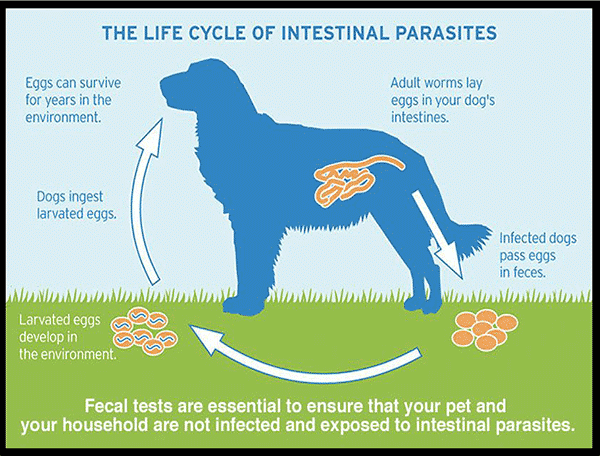Are Intestinal Parasites Affecting Your Pets?
There are a number of intestinal parasites that can pose a threat to your pet’s health.
Roundworms, Tapeworms, Hookworms, Whipworms, Giardia, Coccidia and Stongyloides: are some of the more common parasites found in cats and dogs. Some of these parasites can infect humans as well. To prevent the spread of these parasites, routine fecal testing, good sanitation/environmental control, and a preventative de-worming schedule are essential.
How did they get there?
Most of these parasites are spread by the animal’s ingestion of feces either directly or indirectly. Some can be passed to puppies or kittens through their mother’s placenta or milk. Certain parasites can migrate to other areas of the animal’s body where they can cause harm to your pet. Sometimes cats and dogs will not show obvious signs that they are carrying parasites, however, one of the most common symptoms of having intestinal parasites is diarrhea, sometimes with blood in it. Depending on how large the parasite population is, they can also cause lethargy, decreased appetite, vomiting, weight loss or a poor general appearance.
Remember: Not all worms will respond to the same treatment and no single dewormer will work against every kind of parasite. A fecal sample should be tested after the completion of the treatment. Also, over-the-counter and non-prescription dewormers are often not very effective in ridding your pet of the parasites. Your veterinarian will have the best type of wormer available for the specific type of parasite in your pet. Even though these parasites are pretty common and can sometimes cause no obvious symptoms, it is extremely important to have good parasite prevention. Pets with parasites left untreated can cause more animals to become sick and can increase the risk of spreading to humans. These reasons all support the importance of annual fecal tests and monthly parasite prevention in your seemingly healthy pet.
Giardia is a single-celled parasite, if swallowed, can be damaging to the lining of the intestine and can reduce absorption of nutrients from the food your pet eats. It can be difficult to diagnose compared to other intestinal parasites, and several fecal samples may need to be tested to find it. It can thrive for longer periods of time when the conditions are cool and moist and most pets are infected by drinking water contaminated by feces.
Tapeworms are thin and flat and their bodies are made up of jointed segments. Dogs and cats become infected with tapeworms when they ingest infected fleas or lice. They live in the small intestine and steal nutrients from the food your pet eats. Small, white segments can be found in the hair around your pet’s anus, beneath the tail, or in the litter box or bedding.
To schedule an appointment call our office at 918-250-0883 and check out our coupon page for great deals.

